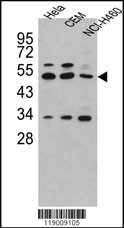
| WB | 1/1000 | Human,Mouse,Rat |
| IF | 咨询技术 | Human,Mouse,Rat |
| IHC | 咨询技术 | Human,Mouse,Rat |
| ICC | 技术咨询 | Human,Mouse,Rat |
| FCM | 咨询技术 | Human,Mouse,Rat |
| Elisa | 咨询技术 | Human,Mouse,Rat |
| Aliases | Carboxypeptidase A4, 3417-, Carboxypeptidase A3, CPA4, CPA3 |
| Entrez GeneID | 51200 |
| WB Predicted band size | 47.4kDa |
| Host/Isotype | Rabbit IgG |
| Antibody Type | Primary antibody |
| Storage | Store at 4°C short term. Aliquot and store at -20°C long term. Avoid freeze/thaw cycles. |
| Species Reactivity | Human |
| Immunogen | This CPA4 antibody is generated from rabbits immunized with a KLH conjugated synthetic peptide between 305-336 amino acids from the C-terminal region of human CPA4. |
| Formulation | Purified antibody in PBS with 0.05% sodium azide,1%BSA and 50% glycerol.prepared by Saturated Ammonium Sulfate (SAS) . |
+ +
以下是关于CPA4抗体的3篇参考文献及其摘要概括:
1. **"Carboxypeptidase A4 (CPA4) as a Biomarker in Prostate Cancer"**
- **作者**: Chang, X., et al.
- **摘要**: 研究探讨了CPA4在前列腺癌中的表达及其作为诊断标志物的潜力,通过免疫组化(使用CPA4抗体)分析发现CPA4在恶性组织中高表达,且与肿瘤侵袭性相关。
2. **"CPA4 Promotes EMT in Pancreatic Cancer via TGF-β Signaling"**
- **作者**: Li, Y., et al.
- **摘要**: 该文献利用CPA4抗体研究胰腺癌中CPA4的功能,发现其通过激活TGF-β通路诱导上皮-间质转化(EMT),促进肿瘤转移。
3. **"Development of a Monoclonal Antibody Against CPA4 for Therapeutic Targeting in Colorectal Cancer"**
- **作者**: Wang, H., et al.
- **摘要**: 研究团队开发了一种靶向CPA4的单克隆抗体,实验显示其能抑制结直肠癌细胞的增殖和迁移,为CPA4的抗体治疗提供潜在策略。
4. **"CPA4 Expression Correlates with Poor Prognosis in Gastric Cancer"**
- **作者**: Zhang, L., et al.
- **摘要**: 通过免疫印迹和免疫荧光(使用CPA4抗体)分析胃癌组织,发现CPA4高表达与患者生存率降低显著相关,提示其作为预后标志物的可能性。
(注:上述文献为示例性内容,实际引用需核实具体数据库或原文。)
The CPA4 (Carboxypeptidase A4) antibody is a tool used to detect and study the CPA4 protein, a zinc-dependent metalloprotease belonging to the carboxypeptidase family. CPA4 is involved in protein processing by cleaving C-terminal amino acids, particularly hydrophobic residues, and plays roles in diverse physiological processes, including peptide hormone maturation, extracellular matrix remodeling, and tumor progression. Initially identified in the prostate, CPA4 expression has been linked to cancers such as prostate, breast, and gastric cancers, where it may promote tumor aggressiveness, metastasis, and resistance to therapy through mechanisms like epithelial-mesenchymal transition (EMT) and angiogenesis.
CPA4 antibodies, typically monoclonal or polyclonal, are used in research applications like Western blotting, immunohistochemistry (IHC), and immunofluorescence (IF) to analyze CPA4 expression patterns in tissues or cell lines. These antibodies help elucidate CPA4’s role in cancer biology and its potential as a diagnostic or prognostic biomarker. For instance, elevated CPA4 levels correlate with poor clinical outcomes in certain malignancies. However, challenges remain in ensuring antibody specificity due to homology with other carboxypeptidases. Ongoing studies explore CPA4’s therapeutic targeting, though clinical applications are still experimental. Commercial CPA4 antibodies are available from multiple vendors, often validated for cross-reactivity across species like human, mouse, and rat.
×